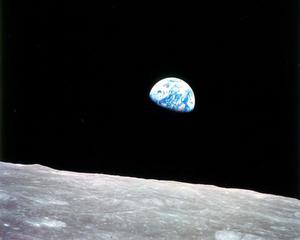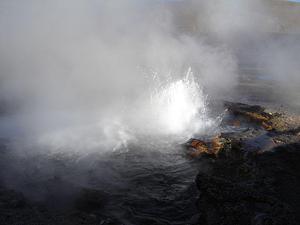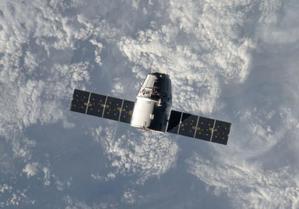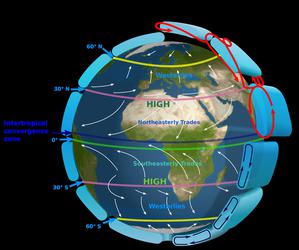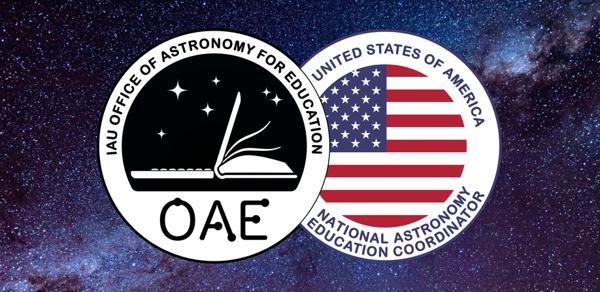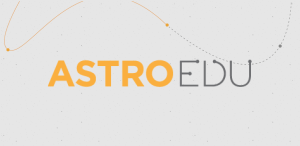Glossary term: Atmósfera
Description: La atmósfera es una capa de gas que rodea un cuerpo celeste. Se mantiene gracias a la atracción gravitatoria del cuerpo celeste, por lo que es más densa en la superficie y se funde con el espacio interplanetario a gran altitud.
En los planetas con superficies sólidas o líquidas, el límite inferior de la atmósfera es claro. Las estrellas tienen interiores gaseosos, por lo que no tienen un límite inferior claro para sus atmósferas. Una atmósfera estelar se refiere normalmente a la capa gaseosa exterior de una estrella a través de la cual la luz del interior viaja hacia el espacio.
El campo magnético de un planeta puede proteger su atmósfera de una rápida disipación en el espacio a causa del viento solar o estelar. En el caso de la Tierra, también protege a todos los organismos de los daños genéticos debidos a los efectos nocivos del viento solar y los rayos cósmicos.
Related Terms:
See this term in other languages
Term and definition status: The original definition of this term in English have been approved by a research astronomer and a teacher The translation of this term and its definition is still awaiting approval
The OAE Multilingual Glossary is a project of the IAU Office of Astronomy for Education (OAE) in collaboration with the IAU Office of Astronomy Outreach (OAO). The terms and definitions were chosen, written and reviewed by a collective effort from the OAE, the OAE Centers and Nodes, the OAE National Astronomy Education Coordinators (NAECs) and other volunteers. You can find a full list of credits here. All glossary terms and their definitions are released under a Creative Commons CC BY-4.0 license and should be credited to "IAU OAE".
If you notice a factual or translation error in this glossary term or definition then please get in touch.
Related Activities
Blue Marble in Empty Space
astroEDU educational activity (links to astroEDU website) Description: Students are taken on a virtual journey to outer space to experience that we live on a tiny planet that floats in a vast and empty space.
License: CC-BY-4.0 Creative Commons Reconocimiento 4.0 Internacional (CC BY 4.0) icons
Tags:
Life
, Hands-on
, Model
, Scales
, Distances
, ISS
Age Ranges:
6-8
, 8-10
Education Level:
Primary
, Secondary
Areas of Learning:
Interactive Lecture
, Modelling
Costs:
Low Cost
Duration:
30 mins
Group Size:
Group
Skills:
Asking questions
, Communicating information
, Developing and using models
Fizzy Balloons – CO2 in School
astroEDU educational activity (links to astroEDU website) Description: Investigate the properties of carbon dioxide with this fun demonstration.
License: CC-BY-4.0 Creative Commons Reconocimiento 4.0 Internacional (CC BY 4.0) icons
Tags:
Life
, Hands-on
, Chemistry
, Earth Science
, Carbon Dioxide
Age Ranges:
8-10
, 10-12
Education Level:
Primary
, Secondary
Areas of Learning:
Interactive Lecture
, Traditional Science Experiment
Costs:
Medium Cost
Duration:
2 hours
Group Size:
Group
Skills:
Analysing and interpreting data
, Asking questions
, Constructing explanations
, Engaging in argument from evidence
, Planning and carrying out investigations
Investigating the Atmosphere – Air Takes Up Space
astroEDU educational activity (links to astroEDU website) Description: Air takes up space even though you cannot see it.
License: CC-BY-4.0 Creative Commons Reconocimiento 4.0 Internacional (CC BY 4.0) icons
Tags:
Geography
, Mathematics
, Air
Age Ranges:
6-8
, 8-10
Education Level:
Primary
Areas of Learning:
Modelling
, Social Research
Costs:
Low Cost
Duration:
1 hour
Group Size:
Group
Skills:
Analysing and interpreting data
, Asking questions
, Communicating information
, Constructing explanations
, Planning and carrying out investigations
The Intertropical Convergence Zone
astroEDU educational activity (links to astroEDU website) Description: The air circulation system: how are winds created?
License: CC-BY-4.0 Creative Commons Reconocimiento 4.0 Internacional (CC BY 4.0) icons
Tags:
Climate
, Updraft
, Convection
, Winds
Age Ranges:
12-14
, 14-16
Education Level:
Middle School
Areas of Learning:
Discussion Groups
, Modelling
, Social Research
Costs:
Medium Cost
Duration:
1 hour
Group Size:
Group
Skills:
Communicating information
, Constructing explanations
, Developing and using models
, Engaging in argument from evidence
, Planning and carrying out investigations
